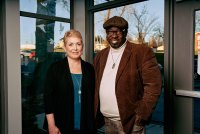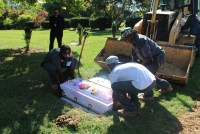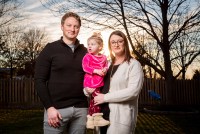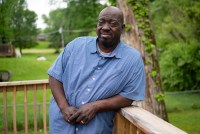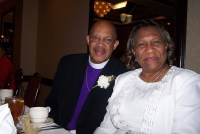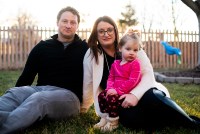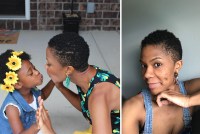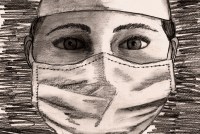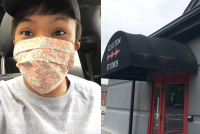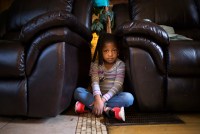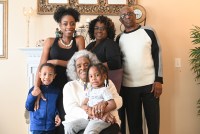To Combat Gun Violence, This Artist Turns Ammunition Into Art
In a city plagued by gun violence, Mykael Ash is turning ammunition into art. Ash, who lives in East St. Louis, Illinois, frequently walks through parts of the city where bullet shells aren’t hard to find. The shell casings represent a cycle of inequality, Ash says, and the art he makes with it serves as a call to action.
Race Is Often Used as Medical Shorthand for How Bodies Work. Some Doctors Want to Change That.
Physicians have long believed it’s good medicine to consider race in health care. But recently, rather than perpetuate the myth that race governs how bodies function, a more nuanced approach has emerged: acknowledging that racial health disparities often reflect the effects of generations of systemic racism, such as lack of access to stable housing or nutritious food.
Caskets Wrapped in Colorful Images Pay Tribute to Young Lives Lost to Trauma and Violence
Mourners are wrapping caskets in imagery, similar to the way companies wrap logos around cars, trucks, and buses. Across the country, casket-wrap companies create custom designs, too often for grieving parents who have lost their children to gun violence.
Black Tech Founders Want to Change the Culture of Health Care, One Click at a Time
Just as Uber Eats and Grubhub revolutionized food delivery, Black tech entrepreneurs want to change the way patients connect with doctors. They are using technology to match people of color with culturally competent professionals and the transportation they need to get to them.
In Rural America, Twisting Arms to Take a Covid Vaccine First Takes Trust
In communities across the country, the Cooperative Extension System, the same organization that supports 4-H clubs nationally, is tapping its roots in rural communities to promote vaccines. But its approach to getting people vaccinated in many communities, including Cairo, Illinois, must be nuanced.
Bye-Bye to Health Insurance ‘Birthday Rule’? Kansas Lawmaker Floats Fix
U.S. Rep. Sharice Davids (D-Kansas) introduced a bill to do away with a health insurance rule that dictates which parent’s plan becomes a new baby’s primary insurer. This could save some parents from unexpected, sometimes massive medical bills. Davids took up the issue after a KHN/NPR Bill of the Month story on one family’s unexpected $207,455 NICU bill.
Kidney Experts Say It’s Time to Remove Race From Medical Algorithms. Doing So Is Complicated.
When estimating how well a patient’s kidneys are working, doctors frequently turn to an equation that depends on a question: Is the patient Black? Kidney experts are now debating how to remove the race adjustment and whether the question is a function of sound science. It’s considered just the first step in dismantling institutional racism in kidney care.
After Nearly 60 Years of Marriage, This Missouri Couple Stayed Together to the End
Arthur and Maggie Kelley of St. Louis died 30 days apart. Maggie died of complications of dementia in November. Arthur, who had moved into her nursing home to be with her, died a month later of covid. Their family held a double funeral.
Baby Blues: First-Time Parents Blindsided by ‘the Birthday Rule’ and a $207,455 NICU Bill
Charlie Kjelshus needed neonatal intensive care for the first seven days of her life. The episode generated huge bills, and left her parents in a tangle of red tape that involved two insurers, two hospitals and two states.
Black Hair Matters: How Going Natural Made Me Visible
How do we as Black people protect ourselves from racism? In our household, my decision to let my hair go natural forced my father and me to have a conversation about personal safety, the police and my desire to feel free. He viewed my permed hair and weave as a protective shield that increased my chances of making it home safely. But, in reality, my haircut — long or short — can’t protect me from racism.
“Lost on the Frontline” is an ongoing project by Kaiser Health News and The Guardian that aims to document the lives of health care workers in the U.S. who died from COVID 19, and to investigate why so many are victims of the disease.
Missourians to Vote on Medicaid Expansion as Crisis Leaves Millions Without Insurance
Around the country, Medicaid enrollment is up as people who have lost jobs during the pandemic seek health insurance. Expanding eligibility for Missouri’s program, which could help thousands of recently unemployed residents, will be on the ballot Tuesday.
‘Just Make It Home’: The Unwritten Rules Blacks Learn To Navigate Racism In America
Darnell Hill, a mental health caseworker, is teaching black teens in St. Louis how to safely walk through the park, run to the store or handle an encounter with the police. Beyond tangible skills, he offers comfort and a semblance of control to those for whom birding, running or walking down the street hold the risk of racial violence.
Behind The Byline: ‘Contactless Reporting’
Check out the revamped video series from KHN — Behind The Byline: How The Story Got Made. Come along as journalists and producers offer an insider’s view of health care coverage that does not quit.
Searching For Safety: Where Children Hide When Gunfire Is All Too Common
The overall crime rate has dropped during the pandemic, but unfortunately gun violence has not. In St. Louis, at least 11 children have been killed by gunfire so far this year. Living in neighborhoods with frequent violence has forced some families to improvise ways to keep their children safe, even in the place they are supposed to be most secure: their home. The stress of growing up in these conditions could lead to chronic health problems into adulthood.
‘I Wasn’t Eating’: Senior Twin Sisters Battle Pandemic Anxiety Together
Twins Edna Mayes and Ethel Sylvester, 92, are relying on each other through the pandemic, in which one of the hidden dangers is to their mental health.
‘Staying Away From Grandma’ Isn’t An Option In Multigenerational Homes
About 1 in 5 U.S. residents live in multigenerational households. Many of those have three or more generations all under one roof. While the living arrangement has financial and emotional benefits, those families face a unique set of challenges as COVID-19 continues to spread.
More Than 5,000 Surgery Centers Can Now Serve As Makeshift Hospitals During COVID-19 Crisis
Under pressure, the federal government announced it will let surgery centers, hotels and even college dorms serve as hospitals to treat an overflow of patients.
Más de 5,000 centros de cirugía serán hospitales improvisados durante la crisis de COVID-19
Esto le dará al país miles de camas hospitalarias y salas quirúrgicas adicionales, algunas de las cuales cuentan con respiradores o máquinas de anestesia que podrían ser reconvertidas en respiradores.
The Nation’s 5,000 Outpatient Surgery Centers Could Help With The COVID-19 Overflow
A coalition of anesthesiologists wants to repurpose the country’s more than 5,000 surgery centers to serve as emergency overflow amid the coronavirus pandemic. The centers have trained medical staff largely sitting idle, anesthesia machines that could be turned into ventilators, and empty medical space. But obstacles such as federal payment rules, logistics and some skepticism are getting in the way.




